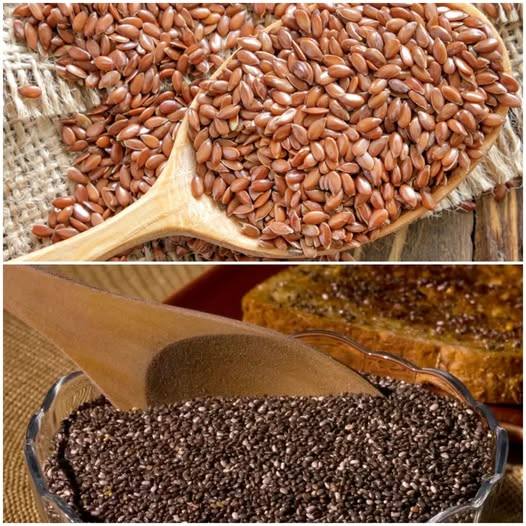ADVERTISEMENT
Chia Seeds vs. Flax Seeds: Benefits Comparison and Which Is Better
In the world of health and wellness, both chia seeds and flax seeds have become staples in many people’s diets. Packed with essential nutrients, these tiny seeds are often lauded for their numerous health benefits. However, when it comes to choosing between chia seeds and flax seeds, the decision can be a bit overwhelming. Each has its unique set of advantages, so understanding the key differences can help you determine which one is better suited to your lifestyle and dietary needs.
What Are Chia Seeds?
Chia seeds are small, oval-shaped seeds harvested from the Salvia hispanica plant, a member of the mint family native to Central America. They have a neutral flavor and are known for their ability to absorb liquid, forming a gel-like consistency when soaked. Chia seeds are rich in fiber, protein, omega-3 fatty acids, and antioxidants, making them a popular choice among health enthusiasts.
What Are Flax Seeds?
Flax seeds, derived from the Linum usitatissimum plant, are flat, oval-shaped seeds that come in two main varieties: brown and golden. Flax seeds have a mild, nutty flavor and are often consumed ground, as whole flax seeds can pass through the digestive tract undigested. Like chia seeds, flax seeds are also packed with essential nutrients, including omega-3 fatty acids, fiber, and lignans, which are plant compounds with antioxidant properties.
Nutritional Comparison: Chia Seeds vs. Flax Seeds
Both chia seeds and flax seeds are nutrient-dense and offer various health benefits. Let’s break down the key nutrients in each:
1. Omega-3 Fatty Acids
- Chia Seeds: Chia seeds are an excellent source of alpha-linolenic acid (ALA), a type of plant-based omega-3 fatty acid. ALA is essential for heart health, reducing inflammation, and supporting brain function.
- Flax Seeds: Flax seeds are also rich in ALA, providing a similar omega-3 content as chia seeds. However, some studies suggest that flax seeds may have a slightly higher concentration of ALA than chia seeds.
2. Fiber Content
- Chia Seeds: Chia seeds are packed with fiber, containing about 10 grams of fiber per ounce (28 grams). The majority of this fiber is soluble fiber, which helps regulate blood sugar, lower cholesterol levels, and promote digestive health.
- Flax Seeds: Flax seeds are also an excellent source of fiber, offering about 8 grams of fiber per ounce (28 grams). Like chia seeds, flax seeds contain both soluble and insoluble fiber, which aids in digestive health and promotes a feeling of fullness.
3. Protein
- Chia Seeds: Chia seeds contain around 4 grams of protein per ounce, making them a good plant-based protein source, especially for vegetarians and vegans.
- Flax Seeds: Flax seeds contain about 3 grams of protein per ounce, slightly less than chia seeds but still a valuable protein source.
4. Antioxidants
- Chia Seeds: Chia seeds are rich in antioxidants, including quercetin, chlorogenic acid, and kaempferol, which help fight oxidative stress and reduce inflammation in the body.
- Flax Seeds: Flax seeds contain lignans, a type of antioxidant that has been shown to reduce the risk of cancer, support hormonal balance, and improve heart health.
5. Vitamins and Minerals
- Chia Seeds: Chia seeds are a good source of calcium, magnesium, phosphorus, and manganese, which support bone health and metabolism.
- Flax Seeds: Flax seeds provide a good amount of magnesium, copper, and vitamin B1 (thiamine), which are vital for energy production, nerve function, and overall well-being.
Health Benefits: Chia Seeds vs. Flax Seeds
1. Heart Health
Both chia seeds and flax seeds are beneficial for heart health due to their high omega-3 content. Omega-3 fatty acids help reduce inflammation, lower blood pressure, and improve cholesterol levels. Regular consumption of either seed has been associated with a reduced risk of heart disease and stroke.
2. Digestive Health
The fiber in both chia and flax seeds promotes healthy digestion. Soluble fiber absorbs water and forms a gel-like substance that helps move food through the digestive tract, preventing constipation. Insoluble fiber aids in regular bowel movements and supports a healthy gut microbiome.
3. Weight Management
Both chia and flax seeds are high in fiber and protein, which can help control hunger and promote a feeling of fullness. Adding either seed to your diet can assist in weight management by reducing overall calorie intake.
For Complete Cooking STEPS Please Head On Ove
